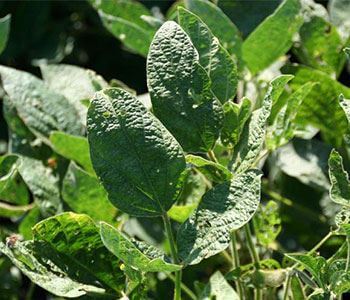Soybean Mosaic Virus
Apr 20, 2020

As the global battle against COVID-19 rages on, let’s talk about yet another viral plant disease. As most of you reading this know, soybeans are ultra-susceptible to a wide array of fungal and bacterial diseases as well as Soybean Cyst Nematode. It should come as no surprise that soybeans are also susceptible to viral diseases. Soybean Mosaic Virus (SMV) is of particular interest because it is definitely present in our geography. SMV presents similar symptoms to other viral diseases including its namesake, a mosaic pattern of dark and light green on the leaf surface along with chlorosis and yellowing. SMV, however, can also cause leaves to pucker or curl which is also a symptom of Group-4 herbicide damage caused by dicamba or 2,4-D. SMV not only affects leaves, but also pods leaving them stunted, flatter, and unable to produce like their healthy counterparts. These symptoms can occur on a single plant or in a pattern throughout the field.
SMV is somewhat different from our previously discussed viruses as it will only initially establish by being present on planted seed. Most soybean varieties we plant today will have a transmission rate of less than 5%. However, if the virus establishes itself onto a plant in this method, soybean aphids can then vector the disease throughout the field and into neighboring fields. Unfortunately, controlling aphids does very little to control this disease. Once symptoms are present, it is impossible to tell how many plants are infected, nor are there any other treatment options. Lowering risk by planting earlier and using only cleaned, certified seed are key in management of this disease.
In reality, this is not an economically disastrous disease by itself. However, viral diseases have a tendency to stack up in a soybean plant. It is the presence of multiple viral diseases in conjunction with fungal and bacterial diseases than can really start to damage yield and profitability. You can rest assured that any seed purchased through Full Circle Ag has an extremely low probability of harboring this disease and a very low transmission rate. However, Roundup Ready One genetics are now off patent, and some producers have opted to start planting seed from their bins. Thanks to insect transmission, this disease has the potential to start becoming more prevalent.

Tony Lyren
Agronomy Sales
Doland
Our mission is to be our customer's first choice for industry-leading resources and knowledge.